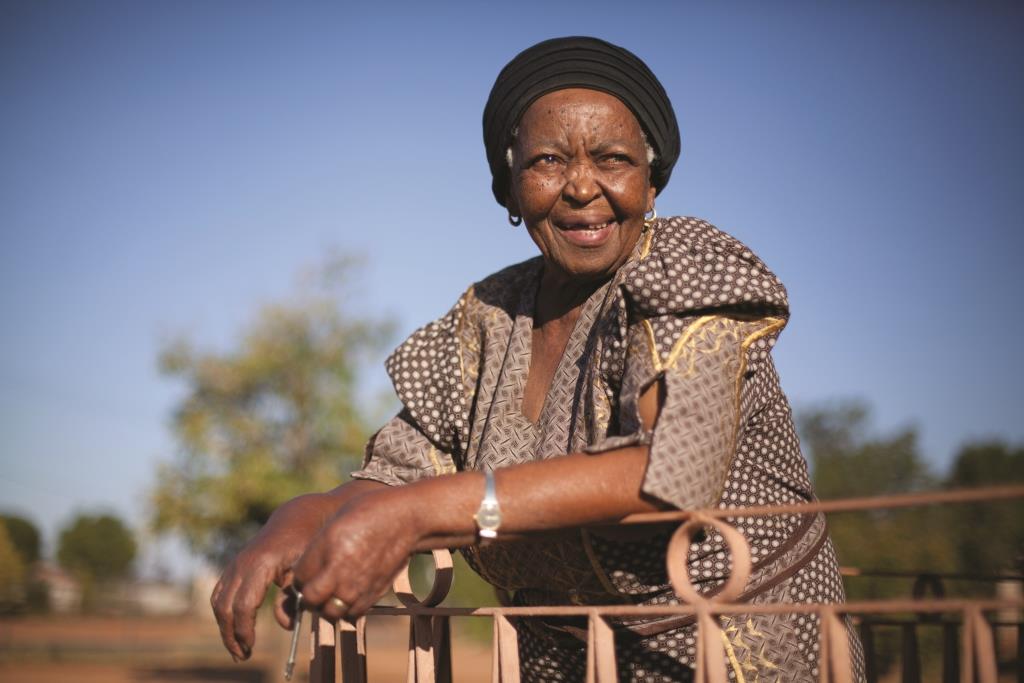Matsatsi Diale woke up on a winter morning with fire and trepidation in her heart. By nightfall, she would be in a prison cell and have a criminal record.
The year was 1956. For months, Diale, a domestic worker, had been preparing with scores of women to protest the pass laws of apartheid South Africa, that restricted the movement of non-white South Africans. If you were caught without one: prison.
Sitting on a green couch, in her family home in Rustenburg, in the North West province, Diale closes her eyes and remembers. Eight thousand women—mothers, wives and daughters—marched from Sophiatown, in western Johannesburg, downtown to Marshall Square, with clenched fists, singing Mayibuya iAfrica, which means ‘let Africa come back’ in Zulu.
Friends warned Diale not to march against armed police, but she knew what she was fighting for.
“It was for us, for our people, for our children. I wanted to see them lead a better life and an easier life than we had.”
They didn’t get far before the police barred their way.
“Just when we reached Newtown police trucks came and opened their doors and we jumped in and sang ‘we’re going to kill Strijdom’ [South Africa’s prime minister at the time]. The police were happy, they yelled back ‘sing nog’ [sing again].”
To this day Diale doesn’t know if the police’s encouragement was in support or if they were being vindictive.
There was no violence between the women and the police. When the police opened the doors of the vans, the women filed in. The idea of the anti-pass campaign was to fill the prisons and paralyze the justice system.
That night, thousands of women crowded into a prison called Number Four—now known as Constitutional Hill, which is the home of South Africa’s Constitutional Court. They were hungry, but refused to eat because they were angry. The women received support from the Black Sash, a non-violent white women’s resistance organization, who ensured that the women had blankets and a measure of protection.
The next day they were transported to Marshall Square for questioning. En route, Diale caught a glimpse of one of the protesters giving birth to a baby boy on the street.
As Diale sat in the cell under the courthouse in Marshall Square, she had no idea what her fate would be. In groups of 30, the women were called into the courtroom to be prosecuted for violating the Passes and Coordination of Documents Act of 1952. Diale prayed that she would not go to prison because she had two children and a husband waiting at home. When her turn came she climbed slowly, step by step. At the top she looked up and saw a face of hope. Nelson Mandela, the future president of South Africa, who was a lawyer at the time, greeted her with a warm handshake and a smile, as he did with each woman.
The atmosphere in the court was somber. The women were quiet.
“It was not out of fear, because we were really not scared, but out of respect. We didn’t feel we had done anything wrong.”
Mandela won the case and the women walked free. As they walked down the street, people were in their backyards celebrating the return of their loved ones.
“It was the same air after a soccer match when the masses celebrate. Sophiatown was abuzz.”
Back in Diale’s home, in Rustenburg, the room goes quiet. She pauses, draws a deep breath and takes a moment to compose herself. The memories of the past have left scars that time may never heal. She looks down at her hands, exhales and carries on.
“Talking about all of this just took me back to a time I wanted to forget. Don’t let me talk too much about that, it wasn’t nice.”
Although the women never reached Marshall Square during their protest, they knew they were part of something greater.
Their march sparked protests around the country and led to one of the largest demonstrations in South Africa’s history on August 9, 1959. It saw 20,000 women of all races march to Pretoria’s Union Buildings, the seat of government, in protest of the pass laws. Today, Women’s Day is celebrated on August 9 in South Africa.
Diale smiles as she remembers the day the pass laws were abolished. On July 23, 1986, due to great international pressure, the South African government ditched passbooks—almost 30 years to the day of the march.
“I heard the news on the radio, everything spread very quickly… You would walk down the street and there were people celebrating everywhere in their backyard. We were all just happy.”
Less than eight years later came the day that will forever be known as Freedom Day. April 27, 1994 saw the country’s first democratic election. Diale, along with other elderly people, voted the day before.
“It was nice. You could vote for anyone. Like you have 10 fingers you could vote for that many people… It was unbelievable.”
In hindsight, although Diale was not fond of the apartheid government, the one thing she feels they managed to do right was build houses.
“Even now those houses are still standing. They are better than those RDP houses [Reconstruction and Development Program houses—an ANC policy to build houses for those who cannot afford them].”
It has been over 50 years since the march. Diale, now in her eighties, has lived through times of trial and believes the present government has a long way to go.
“I’d like South Africa to be more free. I’d like to see better educated kids. Education is the best thing for all these kids. You can be poor but once you are educated you can make something of yourself.”
As for who Diale will vote for in the 2014 election?
“I don’t know. Who is there?” she asks.
